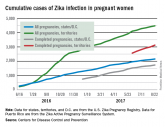Officials at the Centers for Disease Control and Prevention are deactivating their emergency operations related to the Zika virus, the agency announced Sept. 29.
The Zika Coordination and Operations Transition Team will instead shift the CDC’s efforts toward long-term activities, including continued support for physicians counseling pregnant women and advice on follow-up care for infants.
Data from the agency show that while there was a steady stream of possible Zika cases reported among pregnant women in the summer of 2017 – about 100 cases every 2 weeks – the numbers were lower than in 2016, when the infection hit its peak. Overall, during 2015-2017, there have been a total of 2,197 cases of possible Zika infection among pregnant women reported in U.S. states and 4,504 in U.S. territories. During that same time period, there have been 98 liveborn infants with birth defects in the U.S. states and 138 in the U.S. territories.
CDC activated the Emergency Operations Center in January 2016 in response to reports on the impact of Zika virus infection in pregnancy, including cases of microcephaly.
“Deactivation does not mean that the threat of Zika has lessened in importance or that people are no longer at risk of infection,” CDC officials said in a statement. “Zika continues to be a public health threat in the United States and internationally. Zika is still a risk for pregnant women, and the continental United States and Hawaii will continue to see some travel-related cases as travelers visit countries and territories with risk of Zika transmission.”
mschneider@frontlinemedcom.com
On Twitter @maryellenny
